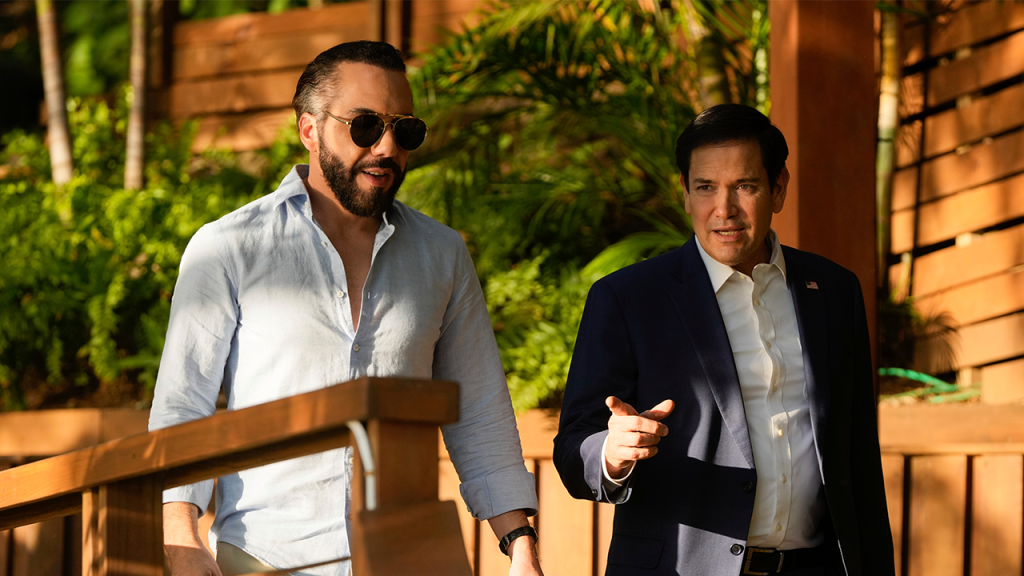El Salvador’s President Nayib Bukele has presented a controversial proposal to the United States, offering to house deported illegal immigrants – of any nationality – in his country’s prison system for a fee. This unprecedented offer, lauded by Senator Marco Rubio as “extraordinary,” emerged during Rubio’s visit to El Salvador as part of a broader diplomatic effort to address regional migration challenges. Bukele’s proposition extends beyond merely accommodating those facing deportation from the U.S.; it includes an offer to incarcerate convicted criminals, including U.S. citizens, in El Salvador’s mega-prison, CECOT. The financial aspect of the proposal involves a fee structure that, while relatively inexpensive for the U.S., would represent a significant revenue stream for El Salvador, potentially bolstering its prison system’s sustainability.
The proposal has sparked immediate debate, with critics like Manuel Flores, secretary general of El Salvador’s leftist opposition party, denouncing the plan as turning the region into a “backyard to dump the garbage” for the U.S. While Bukele’s offer to incarcerate American criminals is legally improbable due to restrictions on deporting U.S. citizens, the core of his proposal – accepting deported illegal immigrants – represents a potential shift in regional migration management. The concept, referred to as a “safe third country” agreement, could be a particularly relevant option for handling convicted Venezuelan gang members in the U.S. if Venezuela refuses to repatriate them. Bukele has also expressed willingness to accept detainees of any nationality, further expanding the scope of the potential agreement.
Bukele’s offer extends beyond accommodating deported individuals to encompass a proactive approach towards tackling gang-related crime. He has committed to accepting and incarcerating all Salvadoran MS-13 gang members currently in the U.S. illegally. Furthermore, his proposal extends to accepting criminal illegal aliens from any country, with a specific emphasis on those affiliated with Venezuela’s notorious Tren de Aragua gang. This multifaceted approach reflects Bukele’s commitment to addressing both the immediate challenges of managing deported individuals and the broader regional security concerns associated with transnational criminal organizations.
Senator Rubio’s visit to El Salvador, part of a five-nation Central American tour, underscores the U.S. government’s focus on strengthening regional cooperation to combat illegal immigration. His presence at a U.S.-funded deportation flight from Panama to Colombia, carrying 43 illegal immigrants apprehended after crossing the Darien Gap, highlights the ongoing efforts to deter illegal crossings and manage migration flows. Rubio’s trip comes amidst a broader freeze on U.S. foreign assistance, although waivers have been granted for certain critical programs in the countries he’s visiting. The senator’s diplomatic efforts aim to encourage regional partners to take a more active role in addressing the challenges of illegal immigration.
The backdrop of Rubio’s visit and Bukele’s proposal is the complex and multifaceted reality of migration in the Americas. Driven by a variety of factors, including economic hardship, violence, and political instability, individuals from across the region continue to seek refuge and opportunity elsewhere, often through irregular channels. The resulting migration flows pose significant challenges for transit and destination countries, straining resources, exacerbating social tensions, and raising concerns about security. The U.S. government, under successive administrations, has sought to address these challenges through various means, including border enforcement, international cooperation, and targeted foreign aid programs.
The proposed agreement between the U.S. and El Salvador represents a potential new chapter in the ongoing efforts to manage regional migration. While the details of any potential agreement remain to be finalized, the proposal raises several important questions about the future of migration management in the Americas. These include the legal and ethical implications of “safe third country” agreements, the potential impact on human rights and due process for deported individuals, and the long-term effectiveness of such arrangements in addressing the root causes of migration. The ongoing dialogue between the U.S. and El Salvador, as well as other regional partners, will be crucial in shaping the future of migration policy and practice in the region.


